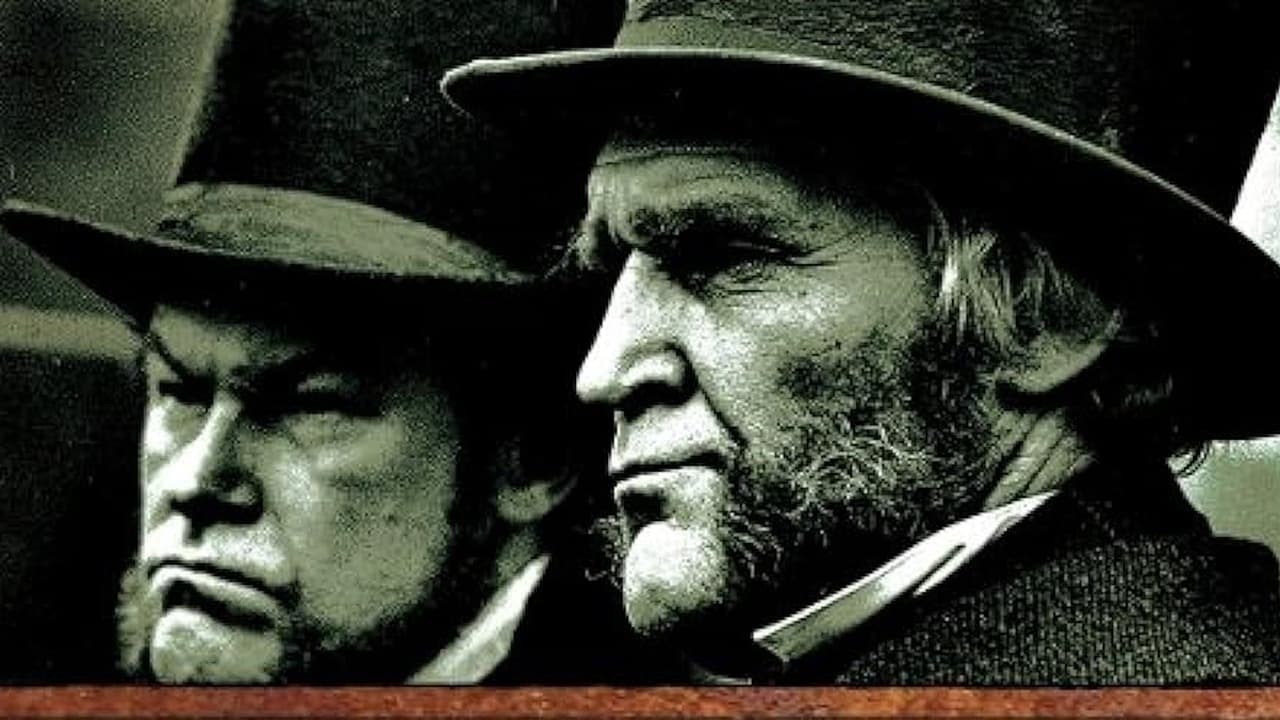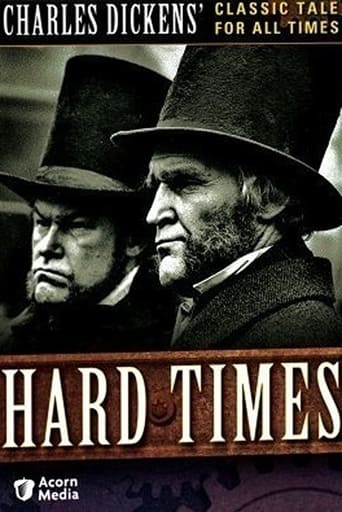

The bleak, depressing atmosphere of a factory town in mid-nineteenth century England is caught and conveyed in this excellent adaptation of the Charles Dickens' novel. Episodes one and two capture the drabness of the town and the how the factory owner combines with the politicians to maintain control of the situation. Far from doing anything to try to ameliorate and improve the lot of the workers, the program shows how those who do not tow the line and demonstrate any independence of thought are ridiculed, ostracized and rejected. The most dramatic and sympathetic character is Stephen Blackpool, who struggles to maintain his integrity in a corrupt environment. Having lived in a poorhouse himself, Charles Dickens was uniquely qualified to write about the abuses inherent in an economic system that systematically sought to keep people in their place and stifle anything that even remotely resembled independence of thought. What is surprising is not that the factory town was inherently a nasty place, but that anyone would go out of their way to defend it.
... View More'Hard Times' is one of Dickens' lesser known novels, but is extremely worthy for all that.It is short and set in the north of England at a time when the industrial revolution has brought sudden wealth to the nouveu-riche of common but fortunate entrepreneurs. These people have no family precedent or history and must make a reputation for themselves. Which they often do with a contemptuous ruthlessness for those of equal birth but far less good fortune.Aptly named Mr Bounderby is just such a man. 'The bully of humility', you can't tell him anything. He got where he is today by sheer exertion and determination. There has never been a hardship to which he was never a stranger. He's rich, a humbug, and a consummate liar.Stephen Blackpool is his alter-ego. Working-class like him, but going nowhere. He's an employee who falls foul of his alcoholic wife, his nascent trade-union, and eventually Bounderby himself. 'It aw' a muddle', is his summation of life.Thomas Gradgrind is very much of Bounderby's way of thinking. They are friends insofar as two people devoid of any human sympathy can be. He's a man of facts. FACTS - and nothing else.It's a simpler and more severe indictment of social-climbing than his much more popular Great Expectations. Comical individuals are few and far between. Heroes are non-existent.Patrick Allen and Timothy West have the leads to perfection. At the same time, every other role is played to a tee by a sprinkling of worthy character actors.This drama is wonderfully realised with an excellent mix of studio and location shooting. The original script is a perfect adaptation. All of the relevant social and personal issues raised by Dickens are included. This is as good as it gets.Modern dramatisations of Dickens are more lavish, expensive and utterly devoid of that essential magic of the Master. This 4-piece work dates from a time when realizing Dickens' ideas was just as important as creating a detailed drama.
... View MoreThis is the best film adaptation of Dickens' best novel. You can't go wrong with this one.The production is low budget, but that actually works in its favor. The film has a grittiness that is entirely appropriate.The script is first-rate and the actors are virtuosos across the board. There is not a note in it anywhere that rings false.If you're tired of the sentimentalism and cartoonish characters usually associated with Dickens, you will be pleasantly surprised. There is none of that here. This is a story about real people. There are no saints, except for Rachel and she's a minor character, and no devils. Even the ostensible villain, Bounderby, is humanized.Dickens on film doesn't get better than this.
... View MoreLooking at the typical Dickens Novel like "Bleak House" or "David Copperfield" or "Our Mutual Friend", the size is usually about 800 - 900 pages. Only three of his novels escape this gigantism. "A Tale of Two Cities" and "Great Expectations" are about 500 - 600 pages each. But most surprising is "Hard Times For These Times" (better known as "Hard Times") which is about 350 to 400 pages.At the time he wrote "Hard Times" (1854 - 55) Dickens' position as the leading British novelist was pretty secure. "Copperfield" and "Bleak House" had determined that. But he was trying to demonstrate that he was also a great magazine editor. His first magazine was entitled "Household Words", and while publishing it he decided to enhance it's readership by writing a novel. Like all of his novels it was published piecemeal, but hitherto Dickens was the author working with other editors - so he was able to get them to accept his prolonged novels with tons of subplots and episodes. Now he was an editor himself, and he realized that he had to trim off the fat. The result was a four part serialized novel, regarding the industrial revolution in the midlands, and possibly (to his millions of fans) the least Dickens-like novel of them all. The proof of this is that, despite it's brief length being a plus for modern readers turned off by 800 - 900 page novels, more people know Dickens for "Copperfield" or "Pickwick" or "Oliver Twist" than are aware of "Hard Times".As pointed out in some of the other reviews here, Dickens is taking a close and skeptical view of the wonderful industrial revolution. His real hero in the novel is Stephen Blackpool, a hard working laborer in the industrial city of Coketown. Blackpool is overworked and underpaid. He has drunken shrew for a wife. He can't find any type of hope in this God - forsaken city. The so - called Labor Unions are of little use (George Orwell notes in his essay on Dickens that they are little better than a protection racket). In the course of the story we watch the tragedy of Blackpool unfold - and how it is impossible to stop it.The villains of the novel include Thomas Gradgrind, an educator and industrialist who is determined to raise a generation of realists. "Teach these children facts...nothing but facts!!", he rails at the start of the novel, and dooms his son and daughter (among others) into a bleak, colorless, joyless existence. He does get his daughter Louisa married to Josiah Bounderby (the second villain), an ironmonger and "self-made man", who won't hear of coddling the workers (the Stephen Blackpools, if you will) of the world - he keeps using a ridiculous metaphor of the workers wanting to drink turtle soup out of silver tureens. Louisa is soon bored by this man, and falls for the blandishments of Mr. James Harthouse, a Member of Parliament and the third villain in the novel. Will she give in to the advances of this cad, or will she be saved by her maid (and friend) Sissy Jupe? The B.B.C. series did pretty well in delineating Dicken's attack on inhuman education and inhuman economics, with a fine cast led by Timothy West as Bounderby, Edward Fox as Harthouse, Jacqueline Tong (Daisy on UPSTAIRS/DOWNSTAIRS) as Louisa, and Rosalie Crutchley as Mrs. Sparskit, Bounderby's housekeeper (who was once an aristocrat - her husband was a Powler we are reminded several times) and who has a secret yen for Josiah.I do have one regret - and if you want to read the novel first do not go beyond this point below: SUPER SPOILER COMING UP: In the novel, Mrs. Sparskit is jealous of Louisa marrying Josiah, and when Louisa has her affair with Harthouse she spies on her. Her intention is to eventually reveal all to Bounderby, who will divorce Louisa and (hopefully) marry Mrs. Sparskit. But while noting Louisa's trysts with Harthouse, Mrs.Sparskit also notes a mysterious elderly woman who is constantly coming to see Josiah. After awhile, she is annoyed at not knowing who this is, and Bounderby's reticence about the matter. Finally, at the conclusion of the novel, she does meet the lady (much to Bounderby's discomfort). It is his mother. Now Bounderby talks with a lower class accent throughout the novel, and Mrs. Sparskit's amorous interest in him is based on the idea that he's low born and wealthy, and she is poor but aristocratic - they are meant for each other because she can raise him properly to his social sphere. Now she finds out that Mrs. Bounderby is not lowly at all - Josiah came from the upper class (just as Mrs. Sparskit did). He just pretended he was self-made for effect in dealing with others. Mrs. Sparskit's scorn for Josiah at the conclusion of the novel was very funny. Unfortunately it was not included in this version of the novel.
... View More